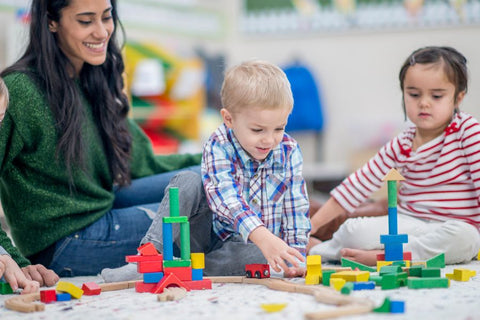Social development is a crucial aspect of a toddler's growth and well-being. It helps them build relationships, develop communication skills, and navigate the world around them.
As parents and caregivers, there are many ways we can support and encourage their social development.
In this comprehensive guide, we'll explore effective ways to nurture your toddler's social development and help them thrive in social interactions.
The Importance of Social Skills in Toddlers
Social skills are essential for a toddler's overall development, influencing their ability to:-
Build healthy relationships with peers and adults.
-
Communicate their needs, thoughts, and feelings effectively.
-
Develop empathy and understanding of others.
-
Navigate social situations with confidence.
10 Tips for Encouraging Social Development
1) Create Play Opportunities
- Play is essential for social development. Encourage your toddler to engage in both independent and cooperative play with toys, games, and activities that promote sharing, turn-taking, and collaboration.
- Arrange playdates with other toddlers to provide opportunities for social interaction and learning through play.

2) Encourage Communication
- Communication is key to social development. Encourage your toddler to express themselves verbally and non-verbally through gestures, facial expressions, and simple words.
- Listen actively and respond empathetically to your toddler's attempts to communicate, fostering a sense of trust and security in their interactions with others.
3) Teach Empathy and Sharing
- Model Empathy: Demonstrate empathy by talking about feelings and encouraging your toddler to do the same.
- Share and Take Turns: Teach the importance of sharing and taking turns during playtime.
4) Promote Independence
- Allow Choices: Let your toddler make age-appropriate choices to boost their independence and self-confidence.
- Celebrate your toddler's social successes and efforts, no matter how small. Praise and encourage positive social behaviors to reinforce their development and build confidence.
- Offer gentle guidance and support when your toddler faces social challenges, helping them navigate difficult situations and learn from their experiences.
5) Be A Role Model
- Children learn by example, so be mindful of your own social interactions and behaviors. Model good manners, communication skills, and problem-solving techniques in your interactions with others.
- Use everyday situations as teaching moments to demonstrate kindness, cooperation, and respect for others.
6) Foster Positive Relationships:
- Create opportunities for your toddler to interact with family members, peers, and other caregivers in a supportive and nurturing environment.
- Encourage positive interactions by modeling empathy, kindness, and respect in your own interactions with others.
7) Positive Social Interactions:
- Help your toddler learn important social skills such as greeting others, taking turns, sharing toys, and expressing emotions in healthy ways.
- Use simple language and positive reinforcement to reinforce social behaviors and encourage empathy and understanding.
- Encourage polite behavior, such as saying "please" and "thank you."

8) Storytelling and Books
-
Read Together: Share books that emphasize social skills, emotions, and problem-solving.
-
Create Stories: Encourage your toddler to create their own stories or drawings to express their thoughts.
-
Communication is key to social development. Encourage your toddler to express themselves verbally and non-verbally through gestures, facial expressions, and simple words.
-
Listen actively and respond empathetically to your toddler's attempts to communicate, fostering a sense of trust and security in their interactions with others.
9) Outdoor Playgrounds:
- Nature Walks: Explore nature together, promoting social skills through shared experiences.
- Take your toddler on outings to parks, playgrounds, libraries, and other community spaces where they can interact with a diverse range of people and explore new environments.
- Encourage curiosity and conversation by pointing out interesting sights, sounds, and experiences during your outings.

10) Create a Safe and Supportive Environment:
- Create a safe and welcoming environment at home where your toddler feels comfortable exploring and interacting with others.
- Set clear and consistent boundaries, and provide guidance and supervision as needed to ensure your toddler's safety and well-being during social interactions.
Nurturing your toddler's social development is an ongoing process that requires patience and consistent support.
By creating opportunities for play, communication, and empathy, you can help your child build essential social skills that will serve them well throughout life.











